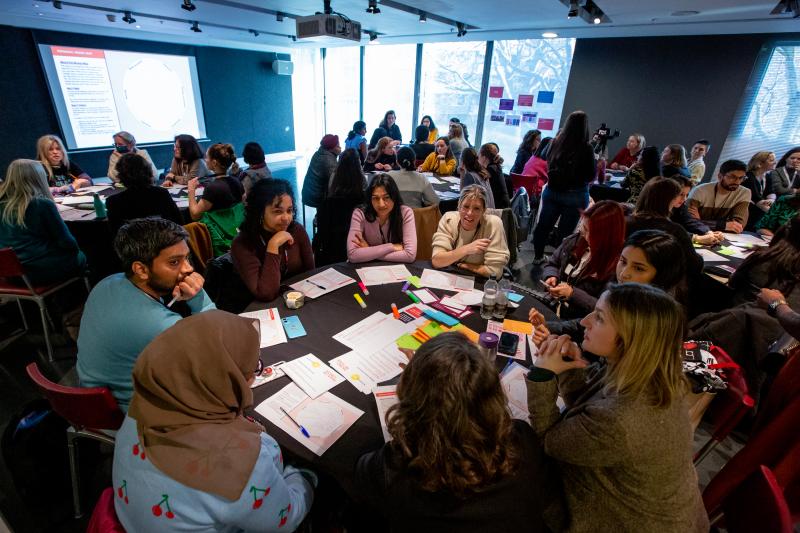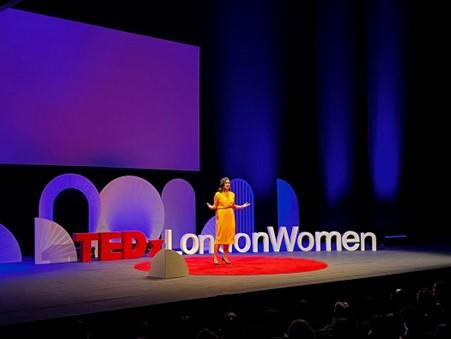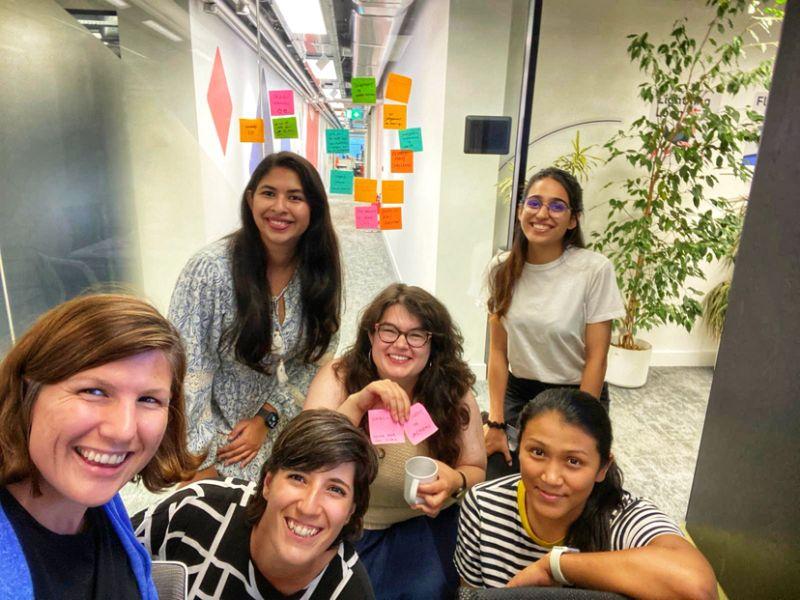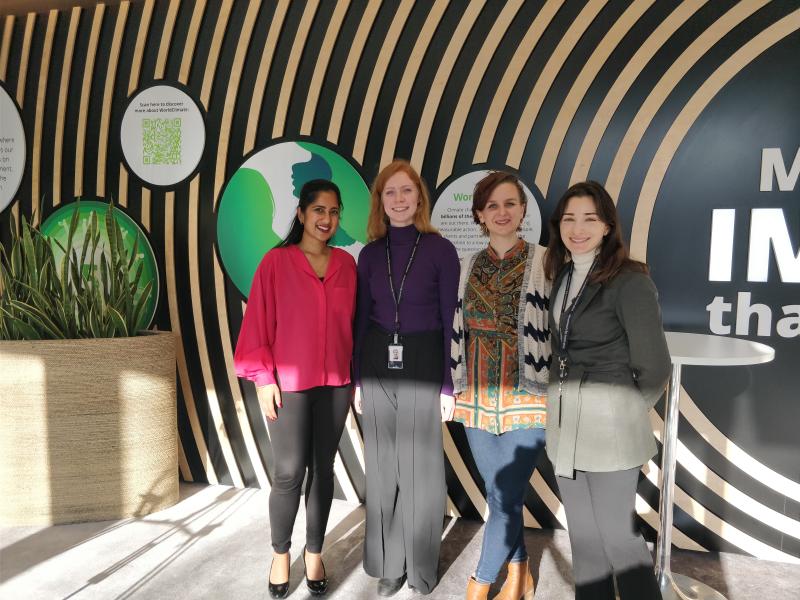Mary Stevens25 Mar 2024
What’s happened to date?
Just over five years ago, in the spring of 2019, Zahra Davidson and I gathered our first pilot cohort of hosts in London and Bristol for the first ‘OwnIt’ training, supported by Triodos Bank. In 2021 we drew up our first formal licence agreement with Huddlecraft to deliver the programme and OwnIt became Money Movers. This collaboration has built a powerful community and catalysed the movement of an estimated £10.6 million for climate action (£3,341,335 money moved + £7,302,546 planned actions), supporting 375 women and allies to take part in peer-to-peer learning programmes that bridge the 'intention to action' gap when it comes to green finance and how to use their money for good.
Some highlights
- Taking Money Movers to COP26 thanks to our friends at Ethex ,
- featuring on Radio 4’s Money Box Live,
- Anneka’s incredible TedX speech to an in-person audience of 1500 people,
- winning a Big Issue Changemakers Award in January this year
- completing our first successful corporate programme with Deloitte.
Our community of hosts has run Money Movers sessions everywhere from parent-and-baby groups to the United Nations. Their feedback and enthusiasm have kept us going. We’ve also been delighted by the unexpected ‘ripples’ – the projects that have emerged from the new connections our participants have made or the ways their confidence has grown – to raising questions about investments as a trustee of a charity, to getting involved with the Tiny Forests movement in South London.
How to achieve Money Movers’ full potential?
We are using the opportunity to conduct a review of Money Movers to support the project to achieve its potential, with the following considerations in mind:
- The financial model. Despite its successes and awards we haven't yet been able to find a sustainable business model for Money Movers - one that balances the costs of the programme (and in particular the coaching model), with a desire to keep the programme open and accessible.
- The systemic impact. Money Movers supports people to take action with their personal finances and works with individual consumers and activists. But how can we ensure that we are also building collective power, in line with Friends of the Earth’s strategy and that these actions add up to more than the sum of their parts? Part of this story must involve mapping our place in the eco-system. What does Money Movers uniquely bring to the movement to shape a new economy and how can we best pool our collective resources for change?
- A change in team After two years leading Money Movers at Huddlecraft, Anneka Deva left the programme and has taken her expertise in movement building and coaching to Neon. Zahra is also taking a step back from day-to-day operations at Huddlecraft at the end of March (although she will remain connected as an associate and non-executive director).
- A change in context. There’s renewed interest in the power of personal finance as a lever for political change, through the Boycott, Divestment and Sanctions movement (and the attempts by the UK Government to undermine this channel of protest). ‘Greenwash’ is also a much bigger issue in the financial services sector, with the Financial Conduct Authority currently consulting on stricter regulations. And of course the economic situation in the UK and the rising cost of living have forced many women to make much tougher financial choices.
- Aligning our finances with our values is less of a priority when we’re thinking more about make ends meet (although as we argued during the Covid outbreak, tough times can sometimes be the right time to review financial priorities and confront our fears).
|
What does this mean?
Our top priority is to make sure that Money Movers’ resources are available to as many people as possible. Thanks to our partnership with Triodos Bank, we are developing a resource hub on our main website. This will create new opportunities to run the programme in community settings, such as a Friends of the Earth Local Action Group, a faith group or other community climate action plan.
At the same time, Huddlecraft will continue to act as delivery partner, implementing the programme within companies and organisations, when opportunities for partnership arise. So if for example, you are inspired by the Deloitte programme and are wondering what that could look like for your own organisation, you can still contact [email protected].
What have we learned?
We’ll explore our learnings in more depth, but this pause is a good moment to think about what we’ll take into the review.
- Money Movers has something unique - it bridges the ‘intention to action’ gap and helps people move from understanding a problem to taking action. Very few campaigns do this well – and we could get better at articulating just what’s so special. At the same time we do need to think hard about how we best intervene to shift the financial system away from fossil fuels and towards a life-enhancing economy. How do we amplify the actions our community takes?
- Perhaps our biggest learning is just how difficult it is to get seed funding when Money Movers is up against programmes that have ‘worthier’ beneficiaries beyond just the women we work with and because it’s hard to make the case for systemic impact. However, we believe it offers interesting opportunities for future collaboration and partnerships. The challenge of shifting to greener finance is huge but Money Movers could play a really meaningful role within a larger set of actors working on that challenge.
- Once people get involved, the appetite for taking meaningful action on climate in a supported and structured space is as strong as ever– but hosts have been finding it harder to recruit and retain participants. There are a number of possible explanations, including a tougher environment for recruiting online, and a wider sense of disempowerment, linked to the cost-of-living crisis. How do we continue to harness the potential of the collective, as we move forward?
Thank you
We are so grateful for all the interest and support we have had along the way. Many apologies if I have missed anyone in the list below. We especially want to thank
Emily Stewart - who supported us to develop the very first pilots.
Our advisory group, and in particular Naomi Alexander Naidoo, Charlene Cranny and Hannah van den Bergh.
Zahra, Anna and especially Anneka at Huddlecraft - for stewarding this journey so beautifully and turning a good idea into a real-life community of action.
Sponsors: including Ethex and Energise Africa (who believed in us very early on), interactive investor, Triodos as well as Anthemis and PartnerRe.
Lucy Traynor and the team at Deloitte for supporting the first corporate programme.
Funders: RSA Catalyst, Friends Provident Foundation, Partners for a New Economy.
Get involved
If you would like to contribute to the review, please contact [email protected]. We would love to hear from you. Perhaps you can support us with business modelling, or systems mapping, or can offer funding for this work? And if you want to run a Money Movers programme in your organisation, or an introductory green finance workshop, you still can. Contact Anna for more info about how Huddlecraft can support you.
Aligning our finances with our values is less of a priority when we’re thinking more about make ends meet (although as we argued during the Covid outbreak, tough times can sometimes be the right time to review financial priorities and confront our fears).





